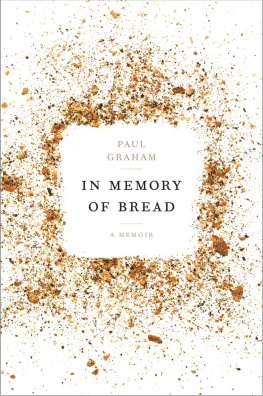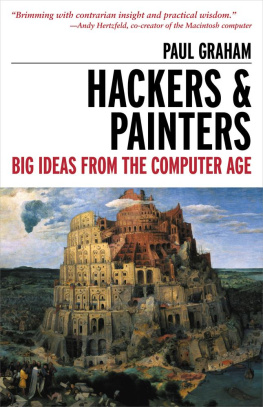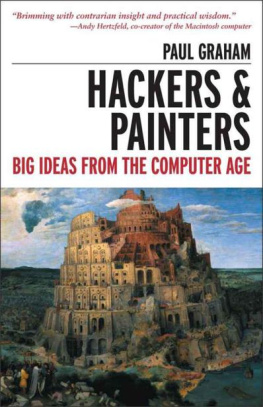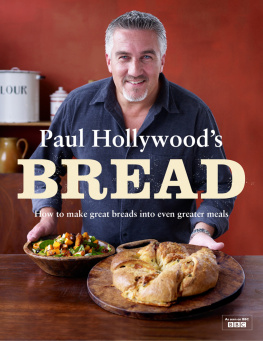Paul Graham - In Memory of Bread
Here you can read online Paul Graham - In Memory of Bread full text of the book (entire story) in english for free. Download pdf and epub, get meaning, cover and reviews about this ebook. year: 2019, genre: Non-fiction. Description of the work, (preface) as well as reviews are available. Best literature library LitArk.com created for fans of good reading and offers a wide selection of genres:
Romance novel
Science fiction
Adventure
Detective
Science
History
Home and family
Prose
Art
Politics
Computer
Non-fiction
Religion
Business
Children
Humor
Choose a favorite category and find really read worthwhile books. Enjoy immersion in the world of imagination, feel the emotions of the characters or learn something new for yourself, make an fascinating discovery.
- Book:In Memory of Bread
- Author:
- Genre:
- Year:2019
- Rating:4 / 5
- Favourites:Add to favourites
- Your mark:
- 80
- 1
- 2
- 3
- 4
- 5
In Memory of Bread: summary, description and annotation
We offer to read an annotation, description, summary or preface (depends on what the author of the book "In Memory of Bread" wrote himself). If you haven't found the necessary information about the book — write in the comments, we will try to find it.
In Memory of Bread — read online for free the complete book (whole text) full work
Below is the text of the book, divided by pages. System saving the place of the last page read, allows you to conveniently read the book "In Memory of Bread" online for free, without having to search again every time where you left off. Put a bookmark, and you can go to the page where you finished reading at any time.
Font size:
Interval:
Bookmark:
sorry something went wrong loading your content. Check the table of contents or try paging forward. Or contact us at support@bookshout.com
sorry something went wrong loading your content. Check the table of contents or try paging forward. Or contact us at support@bookshout.com
A winter several years ago will forever be the time when I discovered the intense yet simple pleasures of great homemade bread. As with most transformative experiences, the timing was everything. My wife started baking in January, after one of our friends introduced her to Artisan Bread in Five Minutes a Day. Its basic recipe, as Artisan devotees know, makes baking bread with a chewy crumb and shattering crust tantalizingly easy: you mix up a mess of dough, let it age in the fridge, and pull out handfuls to shape, let rise, and bake whenever the urge for a fresh loaf strikes. I often stepped insidefrom walking the dog or carrying firewood, leaving behind a blanched sky and snow that literally blew sidewaysto hot bread waiting on the wire rack. The windows were steamed over; the whole house bloomed with heat. What I felt was beyond anticipation or joyit was a sense of wealth and gratitude that humans have known for a long, long time. I couldnt have contrived this feeling if I tried, and it had everything to do with the smell and taste of baked grains against northern New Yorks cold, sparse background.
As she explored the cookbook, Bec made whole-wheat loaves, white loaves, cheddar cheese bread, dinner rolls, cinnamon buns, and my favorite, limpa, a Swedish rye seasoned with orange peel, star anise, cumin, and sugar. At first she baked one or two a week. I tore off chunks while they still steamed from the oven. In the afternoons, I made a cup of tea with toast and chose a jar from The Vault, a hutch in our dining room stacked with homemade preserves like brandied melon jam and crab-apple jelly. Every summer and into the fall, Bec puts up seasonal fruits and vegetables she gets from the market and our farm share, and (in the case of the crab apples, anyway) that we forage on the college campus where I teach English. By most estimates, you only have a year or two to eat that stuff. I was doing my part in the race against spoilage.
Sometimes, I ate a loaf in a day.
Once or twice, I may have eaten almost two loaves in a daymost of ours, and then most of our friends when we went over to their place for dinner, where the talk, which always turned to food, inevitably gravitated to our helplessness around this bread.
Geography was a factor in our raptures. We live in a rural place, and at the time the sole good nearby bakery was attached to our local food co-op. We had been enjoying the co-ops loaves for years, but the Artisan bread was even better, and more fun. We loved the ingenious substitution for the steam jets in professional ovens, which involved pouring a cup of boiling water into a preheated saut pan, creating a dramatic hiss. When we took the bread out and it hit the cooler air, we bent close to the counter and listened as the crust tightened with a series of crackles. But most of all, we loved the sweet, comforting smell of bread baking away as the temperature dropped and we turned local root vegetables into soups and stews.
If we and our friends were conscious of the symbolism of breaking bread at these meals, nobody ever mentioned it. And yet, I think if youd asked any of us whether the experience would have been diminished without my friend Davids triumphant soda bread, or without my friends Sarah and Meres perfect airy, white loaves, or without whatever fifty-times-better-than-supermarket bread anyone else had made, we would have said, Yes, of course. Now I know that to be the truth. You can have fellowship over any meal, but sharing bread seems to deliver an especially high emotional return for a simple food. Bread has always inspired such excitement, even reverence, in those who have so much as stood near a fresh loaf.
In those days I had no reason to feel guilty or wary about my bread consumption. I did not obsess over calories or carbs, preferring to believe that if youre eating good food, whole food, and frequently moving your body, the math all works out in the end. Ill immediately add, however, that until genetics came calling, I had been one of those annoying types who never had to think about what they ateor did not eat. In retrospect I see that I was consuming a ton of gluten. But I didnt know then that gluten could be a problem for me. I didnt think that gluten could be a problem for anyone, actually, until one day when I heard someone, a student of mine or a colleague, mention her dietary restrictions. I registered this persons pain distantly. (As a friend would later say to me, All I know is that Im glad I dont have what youve got.) I certainly did not yet understand that those who cannot tolerate wheat struggle against a tradition so long and so deep that some anthropologists believe that by now, the desire for grain in general, and bread in particular, is all but hardwired into people of European and Middle Eastern ancestry.
Bec registered the staggering speed at which I was consuming her bread. It took her time to make, she said, and itd be nice if now and then a loaf could hang around the house longer than a day and a half. In response, I might have pointed out that ancient Egyptian temple officials, instead of being paid in cash, received a share of 900 fine wheat breads, 36,000 flatbreads roasted in coals, and 900 jugs of beer per year, if the archaeological records are to be believed. (Thats 3,000 flatbreads a month, and you havent even drunk the beer yet.) Surely these officials were feeding their huge families, servants, and slaves. But they still had a few flatbreads left over for themselves. Against such impressive consumption, my own looked modest, even pitiful.
Speaking of 900 jugs of beer: At about the same time as the Artisan Bread discoveries, my friend David and I began brewing beer. In this way, our homes were not unlike those of the ancients, who baked their bread and brewed their beer in adjacent rooms, often using the yeast in the beer scum (known in some places as barm) to inoculate their bread dough.
Thats not how our beer project came about, though. David is a volcanologist, schooled in the geology of small-scale environmental apocalypses, and thus concerned with living in a way that is as gentle on the environment as possible. He believed that home-brewed beer could be as good as most commercial brews, and also more ecologically sound: less gasoline used in transport, less refrigeration at the store, less packaging in the recycling bin. We set out to start our own school of sustainabilitygreen hedonism. Our goal was to become completely self-sufficient in the beer department. The challenge was that David could drink a lot of beer. I had a lower tolerance but still put in a respectable effort.
We started in March by putting up five gallons of American-style amber ale from a kit. We boiled the wort and added hops, cooled it, pitched our yeast, and left our beer to ferment in a sterile and air-locked five-gallon bucket. After a week we added two ounces of Cascade hops, a common American varietal, and let it continue to ferment. Then we bottled our ale and waited for it to age. Finally, in May, we sat on Davids deckthe flat roof of the porch below his second-story duplex, which we accessed by climbing through a windowand watched the sun set over the trees as we emptied the bottles over two or three weekends. Quite often we accompanied our beer with some cheese and, naturally, a fresh loaf of bread.
By midsummer, we had twenty-five gallons of beera couple hundred bottlesin some stage of the brewing process. The five-gallon carboys burped and fizzed with a new pale ale in fermentation, while bottles of stout and porter hibernated like black bears in the back of my walk-in pantry. We felt giddy with beer-wealth. The ATF had probably begun watching us. We could see the day coming when we would possess a mix of seasonally appropriate beers that wed need only to go into the cellar or the pantry or the garage or the upstairs closet to retrieve.
Font size:
Interval:
Bookmark:
Similar books «In Memory of Bread»
Look at similar books to In Memory of Bread. We have selected literature similar in name and meaning in the hope of providing readers with more options to find new, interesting, not yet read works.
Discussion, reviews of the book In Memory of Bread and just readers' own opinions. Leave your comments, write what you think about the work, its meaning or the main characters. Specify what exactly you liked and what you didn't like, and why you think so.










